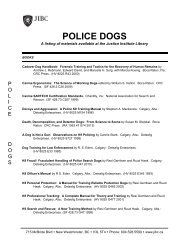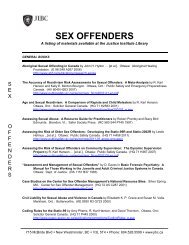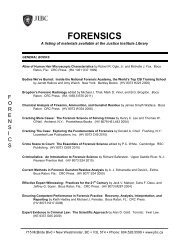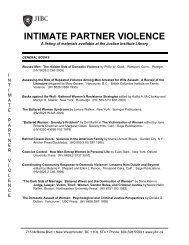legally speaking - Justice Institute of British Columbia
legally speaking - Justice Institute of British Columbia
legally speaking - Justice Institute of British Columbia
Create successful ePaper yourself
Turn your PDF publications into a flip-book with our unique Google optimized e-Paper software.
a considerable distance away from the building<br />
named in the warrant and with no apparent<br />
connection to the criminal activity under<br />
investigation. For example, on the Crown’s<br />
theory, had there been a cabin in the woods well<br />
away from the clearing in which the [main]<br />
residence was located, the police would have<br />
been entitled to approach it, examine the<br />
exterior, and look through the windows.<br />
This does not mean that the police cannot take<br />
reasonable steps to protect themselves and<br />
others during the execution <strong>of</strong> a search warrant.<br />
I recognize, as the Crown pointed out in its<br />
submissions, that the execution <strong>of</strong> warrants can<br />
give rise to <strong>of</strong>ficer-safety concerns and that those<br />
concerns can be heightened when the place<br />
being searched is on a multi-structure rural or<br />
semi-rural property. However, the interests <strong>of</strong><br />
law enforcement must be balanced with the<br />
rights <strong>of</strong> members <strong>of</strong> the public.<br />
In my view, when a warrant has been issued to<br />
search one place or premises on a particular<br />
property, the police, in the course <strong>of</strong> executing<br />
that warrant, have the authority, at common law,<br />
to inspect and enter other places or premises on<br />
that property to the extent reasonably necessary<br />
to protect themselves and others. However, they<br />
cannot take such action as a matter <strong>of</strong> course, or<br />
on the basis <strong>of</strong> generalized, non-specific,<br />
concerns. Before acting, they must have a<br />
reasonable basis for believing there is a<br />
possibility that their safety, or the safety <strong>of</strong><br />
others, is at risk. [paras. 57-59]<br />
This approach is similar to that taken with respect to<br />
the authority <strong>of</strong> the police to conduct searches<br />
incidental to investigative detentions. In those cases,<br />
the police have a common-law power to detain a<br />
person for investigation and, in certain<br />
circumstances, the police can conduct a limited<br />
protective search <strong>of</strong> a detainee. Similarly, the<br />
approach taken with respect to unannounced (i.e.,<br />
no knock) forced entry into a dwelling-house in the<br />
execution <strong>of</strong> a search warrant was also instructive. In<br />
such cases, a no-knock entry can be made in<br />
response to concerns for police and occupant safety<br />
based on an individualized assessment <strong>of</strong> the<br />
circumstances. The Court continued:<br />
Volume 11 Issue 1 - January/February 2011<br />
PAGE 40<br />
There can be no question that police <strong>of</strong>ficers are<br />
acting in the exercise <strong>of</strong> a lawful duty when they<br />
execute a search warrant. The critical issue is<br />
whether conducting what I would call “security<br />
checks” <strong>of</strong> places or premises on the same<br />
property as the place or premises covered by a<br />
warrant is a justifiable use <strong>of</strong> a power associated<br />
with that duty. In my view it is. ... “[P]olice<br />
<strong>of</strong>ficers are entitled to take reasonable steps to<br />
minimize the risks they face in the performance<br />
<strong>of</strong> their duties”. Accordingly, if police <strong>of</strong>ficers<br />
have reasonable grounds to be concerned that<br />
there is a possibility that someone who poses an<br />
immediate risk to their safety or the safety <strong>of</strong><br />
others is in such other place or premises, then<br />
they can take reasonable steps to minimize that<br />
risk. [para. 65]<br />
Exigent Circumstances<br />
Under s. 11(7) <strong>of</strong> the CDSA there is an “exigent<br />
circumstances” exception to obtaining a warrant.<br />
Exigent circumstances can include situations where<br />
there is an imminent danger <strong>of</strong> the loss, removal,<br />
destruction or disappearance <strong>of</strong> evidence if the<br />
search or seizure is delayed or where immediate<br />
action is required for the safety <strong>of</strong> the police:<br />
Clearly, when police <strong>of</strong>ficers have the grounds<br />
necessary to obtain a warrant and a reasonable<br />
basis to believe that the evidence being sought<br />
will be lost or destroyed before a warrant can be<br />
obtained, they can act without a warrant. ...<br />
Similarly, ... there will be situations where safety<br />
concerns will satisfy an exigent circumstances<br />
exception to a warrant requirement. [references<br />
omitted, paras. 70-71]<br />
But not all <strong>of</strong>ficer safety concerns will exempt the<br />
need for a search warrant. “While safety concerns<br />
can trigger a statutory exigent circumstances<br />
exception to a warrant requirement, it does not<br />
follow that such concerns will always satisfy those<br />
exceptions. Those concerns must make obtaining a<br />
warrant impracticable,” said <strong>Justice</strong> Frankel. “I do<br />
not accept that <strong>of</strong>ficer-safety concerns that arise only<br />
upon, and as a result <strong>of</strong>, the commencement <strong>of</strong> a<br />
search are sufficient to justify that search being<br />
conducted without a warrant.”






